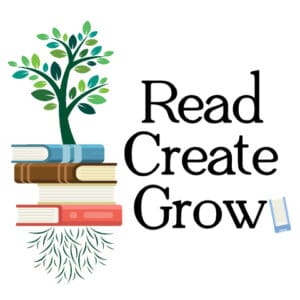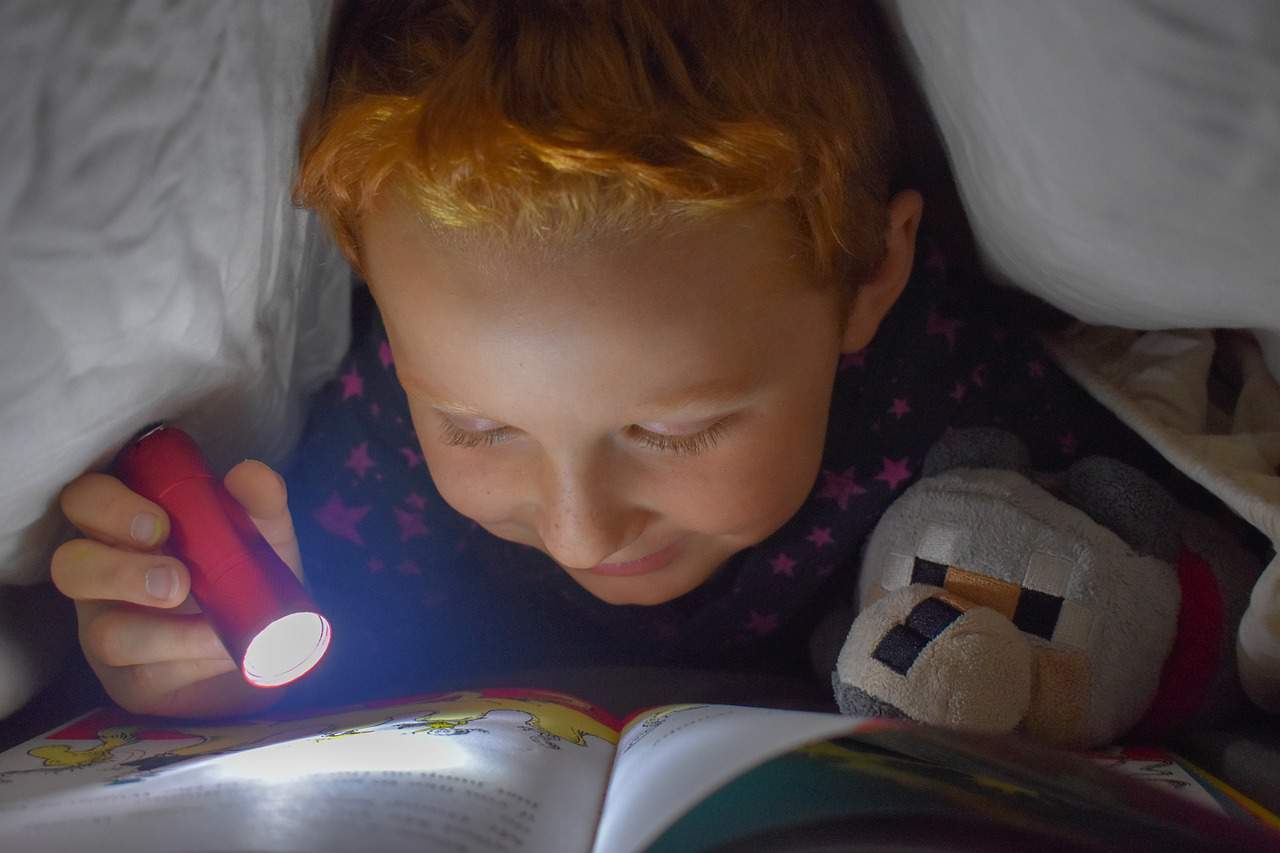The quest for the “just right” book is one that continues. After every completed “just right” book comes the hunt for the next. But you don’t have to rely on luck to stumble across it, or stage a quest into forbidden lands to find it. You just need to use the Five Finger Test.
The fastest way to check if a book is a level in which your child can succeed and improve their reading is with the Five Finger Test. These are the steps for the Five Finger Test:
- Select a book your child has expressed interest in
- Choose a page in the middle of the book and have your child read the page aloud
- One unknown word = one finger held up. Zero-one fingers means this book might be too easy but can be read independently, five fingers means this book is too hard and could lead to frustration. Two to four fingers means the book is challenging but mostly accessible.
- Ask your child to summarize what they just read aloud to check for reading comprehension
Choosing a book that is “just right” for your child can feel daunting. There can be a lot of pressure on making sure this venture is successful, whether that pressure is real or perceived doesn’t really matter, it can still feel stressful.
The Five Finger Test is something you may have heard a teacher or librarian reference, or perhaps it is an entirely new idea. But it is a portable and reliable way to check if a book is within the scope of your child’s reading ability. It has the added benefit of allowing you and your child to decide together what the “just right” book is, rather than relying solely on your judgement for enjoyment and their judgment for difficulty. If you received your child’s reading level scores, but aren’t sure what to make of it, read about how to decipher reading level scores here.
My child wants to read a book that I think will be too hard, what do I do?
Assuming you have read or perused it for age-appropriate content and found it acceptable, try reading the book together. You can take turns reading, alternating a single page, several pages or a chapter. Or read the book out loud to your child in a fun throwback to story time. When you come to a word that is challenging, ask your child to use context clues to think of what it might mean, rather than just providing an answer. For example, if the sky is described as “cerulean,” you might say, “Hm, “cerulean” is new, I wonder what it means? What other color is the sky usually called? Blue, that’s right! So maybe “cerulean” is a shade of blue! Does that make sense here? Great job!”
Or teach your child to use a physical dictionary to look up the word. The process of looking up a word in a hard copy dictionary will reinforce aspects of reading because it will require letter knowledge (where in the alphabet is the word), reading other words, and they may learn unexpected vocabulary words in the process!
How Do I Find the Reading Level of a Book?
You may be asking how to even get to the point where you can try a Five Finger Test on a book, there are so many books to choose from, how can you tell if you’re even on the right shelf? If there is no knowledgeable book person in the vicinity, there are several databases you can start with that will provide a list of books based on a selected reading level.
You can work off the reading level provided by your child’s teacher or their grade level and move up or down from there. Most reading level tests provide both a score for your child and a score for books, your job is to help your child find a good fit within a range of scores. Working with one of the three databases below should net you a few good book lists to start with.
Lexile Find A Book Hub
Lexile uses the Lexile Find A Book Hub. Here you can create an account to track your selections and reading progress over time. It provides several ways to search for an appropriate book. You can search by author, title or ISBN number, then narrow down the search with additional parameters such as grade, reading difficulty, Lexile score or Lexile range and even a Fountas and Pinnell score (if you have one).
Unique amongst other score-related book finding sites is that you can also include genre, award winning or books part of a series as sub-filters. There are tools on the left-hand bar that can do things like generate vocabulary lists based on grade and frequently used words; there is also an analyzer which allows you to drop in text for level analysis. There is even a math skills database. Additionally, this search can be done in Spanish, though there are fewer filtering options.
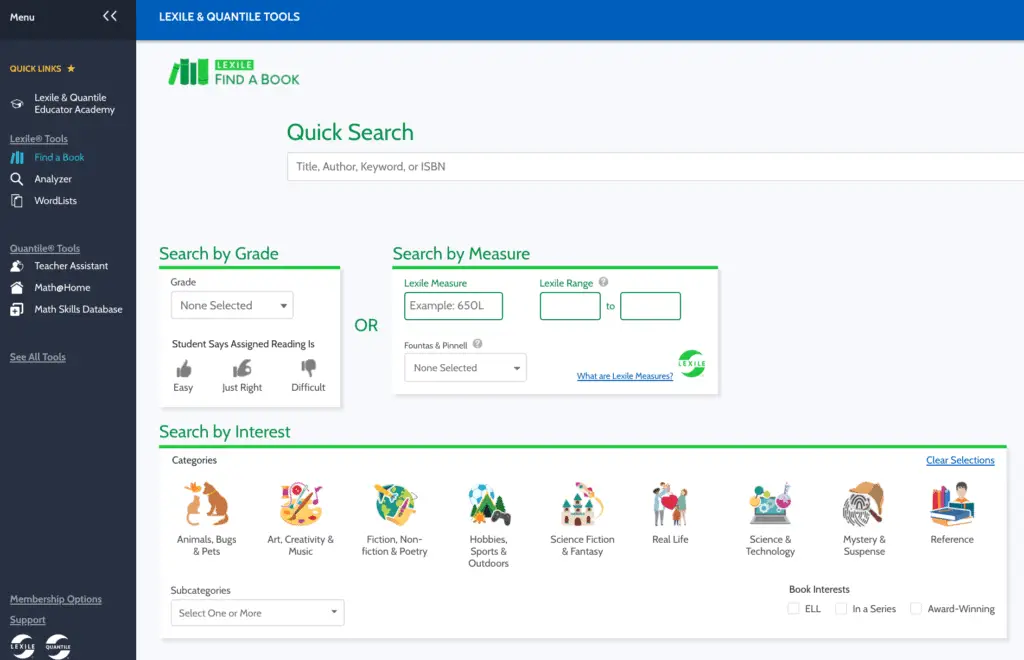
Accelerated Reader Book Finder
If your student has an Accellerated Reader (AR) score, then AR Book Finder will be your database. Start by selecting who you are (student, parent, teacher, librarian) to enter the site, then you are taken to the main page. This one is somewhat less interesting to look at than the Lexile Book Hub. The first option is a Quick Search with a simple search bar, the Advanced Search provides more options, such as filtering by quiz type, grade (called an ‘Interest Level’) and a very detailed list of potential subjects.
If you search by topic and interest level the database will populate a list of related books with information about the book, quiz type, star rating (based on other students who rated the book after taking a quiz), as well as a very short description about the book. You can then add it to your “book bag” to track it.
Something to note however, is if you choose to search by title, you do need to be very specific. For example, a search for “Percy Jackson” did not yield “The Lightening Thief” as a top result, or at all, but searching for the specific book title did populate the correct result.
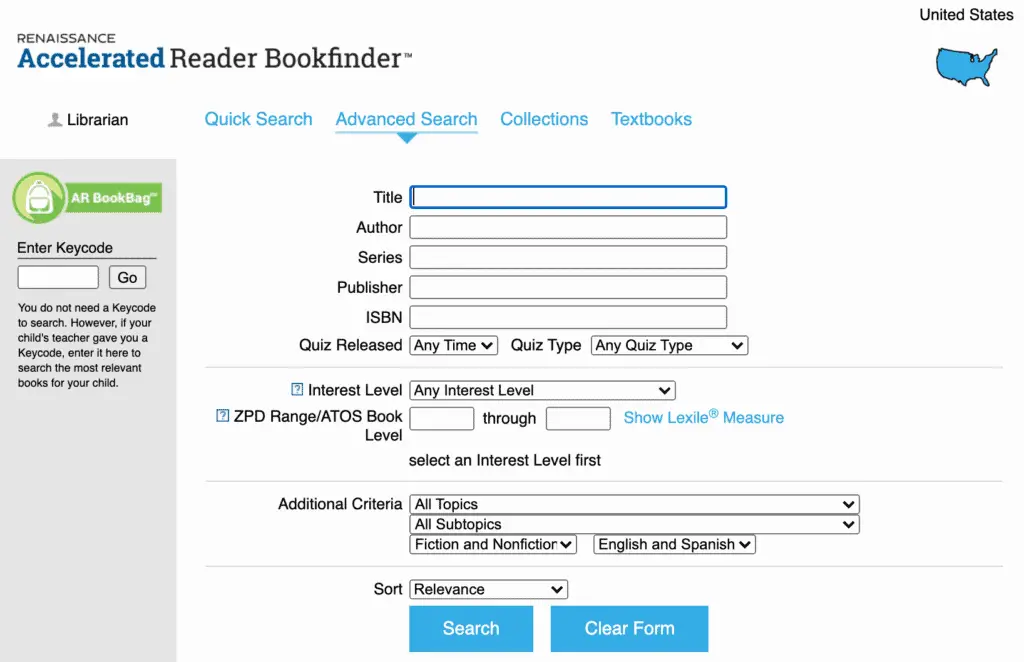
Book Wizard
Scholastic offers a wonderful option if you are looking to find the reading level of a book already in mind. When you go to Book Wizard you can simply type in a book title and it will populate for you several different reading level options, as well as the oh so convenient option to purchase the book from them. It is handy though, if your child has already set their mind on a certain book and simply needs to confirm the level for a report.
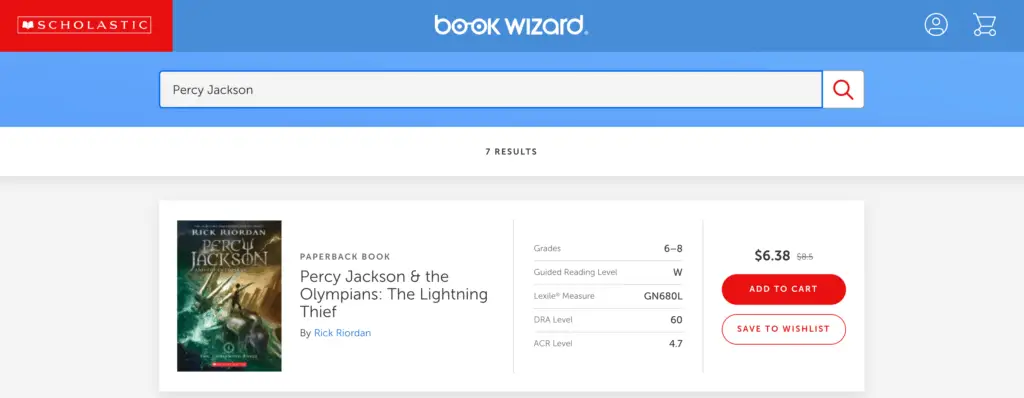
Once you have a book in hand, try out the Five Finger Test and see if that book is indeed the right fit. Your child may find that the words were not that interesting after all, or perhaps it is on the higher end of the reading level range and they aren’t ready to tackle that yet in independent reading.
Then again, maybe you have found a book that was “just right.”
References
AR Book Find. https://www.arbookfind.com/UserType.aspx?RedirectURL=%2fdefault.aspx
Lexile and Quantile Tools. https://hub.lexile.com/
Book Wizard. https://bookwizard.scholastic.com/
